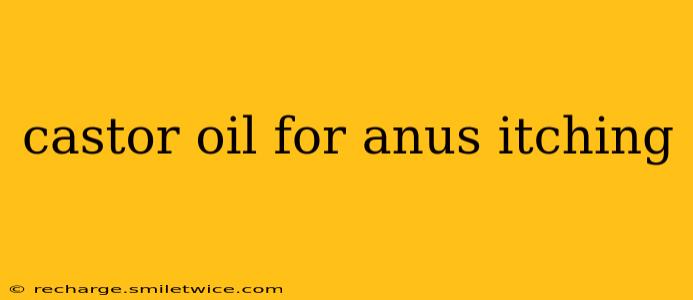Anus itching, also known as pruritus ani, is a common and often uncomfortable problem. While many over-the-counter remedies exist, some individuals explore alternative options like castor oil. This article will explore the potential uses of castor oil for anus itching, examining its purported benefits and potential risks. It's crucial to understand that this information is for educational purposes only and does not constitute medical advice. Always consult a doctor or other qualified healthcare professional before using castor oil or any other treatment for persistent anal itching.
Does Castor Oil Help with Anus Itching?
Castor oil's primary known benefit is its laxative effect. It's often used to relieve constipation, and some believe that by softening stool, it can indirectly alleviate itching caused by hard or impacted stool. However, there's no scientific evidence directly supporting the use of castor oil to treat pruritus ani. While softening stool might help reduce irritation in some cases, it doesn't address the underlying cause of the itching. The itching could stem from a variety of issues, and treating the symptom without addressing the root problem is rarely effective.
What are the Potential Risks of Using Castor Oil on the Anus?
Applying castor oil directly to the anus carries several potential risks:
- Allergic Reactions: Some individuals might be allergic to castor oil, experiencing skin irritation, rash, or swelling.
- Infection: The anal area is sensitive and prone to infection. Applying oil can potentially trap bacteria and increase the risk of infection.
- Irritation: While it might soften stool, the oil itself can irritate sensitive skin, worsening the itching.
What Causes Anus Itching?
Understanding the underlying cause of your itching is crucial for effective treatment. Several factors can contribute to pruritus ani, including:
- Hemorrhoids: Swollen veins in the anus and rectum.
- Fissures: Small tears in the anal lining.
- Infections: Fungal, bacterial, or parasitic infections.
- Allergies: Reactions to soaps, detergents, toilet paper, or other irritants.
- Inflammatory Bowel Disease (IBD): Conditions like Crohn's disease and ulcerative colitis.
- Poor Hygiene: Inadequate cleaning after bowel movements.
- Constipation: Hard stools that can cause irritation.
- Diabetes: High blood sugar can lead to skin irritation.
- Parasites: Pinworms or other intestinal parasites.
How Can I Treat Anus Itching Effectively?
Treatment depends heavily on the underlying cause. A healthcare professional can diagnose the problem and recommend appropriate treatment, which may include:
- Over-the-counter creams and ointments: Hydrocortisone cream can help reduce inflammation and itching.
- Prescription medications: For more severe cases, your doctor might prescribe stronger medications.
- Dietary changes: Increasing fiber intake to prevent constipation.
- Improved hygiene: Gentle cleaning after bowel movements.
- Lifestyle changes: Managing stress and avoiding irritants.
Is it Safe to Use Castor Oil as a Laxative?
While castor oil is often used as a laxative, it's important to use it cautiously. Overuse can lead to dehydration and electrolyte imbalances. It's also not a long-term solution for constipation. If you're experiencing chronic constipation, consult a doctor to determine the cause and develop a safe and effective treatment plan.
When Should I See a Doctor for Anus Itching?
Seek medical attention if:
- Your itching is severe or persistent.
- You notice bleeding or other unusual symptoms.
- Over-the-counter remedies provide no relief.
- You suspect an infection.
Disclaimer: This information is for educational purposes only and should not be considered medical advice. Always consult with a healthcare professional before starting any new treatment, including using castor oil for anus itching. They can accurately diagnose the cause of your itching and recommend the most appropriate course of action.
